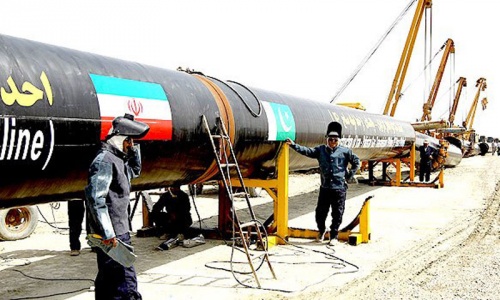ISLAMABAD: Iranian Oil Minister Bijan Zanganeh on Tuesday said that his country was committed to go ahead with the controversial Iran-Pakistan gas pipeline project but a final decision in this regard would only be made after Pakistan relays its stance officially.
“Iran is committed to this gas agreement but until Pakistan has not officially relayed its stance, we cannot react and make a decision,” he was quoted as saying by the Mehr news agency.
In late October, Zanganeh had said he had “no hope” for the project, citing financial problems.
Meanwhile, Pakistan said that work on the pipeline cannot proceed because of sanctions imposed on Tehran by the United Sates and the Eurpeon Union.
Pakistani petroleum minister Shahid Khaqan Abbasi informed the National Assembly yesterday that the work on the pipeline was not possible because it falls under the sanctions imposed by the US and EU.
“In the absence of international sanctions the project can be completed within three years, but the government cannot take it any further at the moment because international sanctions against Iran are a serious issue,” he said without elaborating on how the sanctions could derail the project.
The Iranian side of the $7.5-billion project is almost complete, but Pakistan has run into repeated problems paying for the 780 kilometre (485 mile) section to be built on its side of the border.
Last year, Pakistan had asked Iran for $2 billion in financing to build its side of the controversial gas pipeline.
Iran has the second largest gas reserves in the world but has been strangled by a Western embargo that has seen its crude exports halved in the past year.
US officials had earlier warned that the Iran Pakistan pipeline project would risk triggering sanctions aimed at Iran.
The long-delayed pipeline that would link the two neighbours was planned to ease Pakistan's chronic gas shortages.
Iran currently produces around 600 million cubic metres of gas per day, almost all of which is consumed domestically due to lack of exports. Its only foreign client is Turkey, which buys about 30 million cubic metres of gas per day.
Former president Asif Ali Zardari and his Iranian counterpart Mahmoud Ahmadinejad had announced in February last year to complete the project in 15 months.
But analysts doubted the sincerity of the present government to follow up the venture because of close ties between the PML-N leadership and Saudi Arabia which is reported to be against the project.
Pakistan will have to pay a penalty if it failed to lay the $1.3 billion pipeline within its territory by December this year, but the petroleum minister told the house that the job could be done only after the lifting of sanctions against Iran.
Pakistan has been persuading Iran to review the timeline of the project.
The Karachi stock exchange took fright when the much-delayed section of pipeline was inaugurated in March last year. Spooked by fears of US sanctions, the main index slumped almost 2.5 per cent.
Pakistan has severe gas crisis as natural gas supply to homes and factories almost hit the dead end in winters and the consumers have to rely on the Liquid Petrobium Gas (LPG) cylinders.
The compressed natural gas (CNG), used as fuel in cars to improve environment and reduce cost also shuts down for three days a weak during the tight supply months in the most-populated Punjab province.
Many Pakistanis have converted their cars to run on CNG, depending on it as a cheaper alternative to petrol and diesel.













































